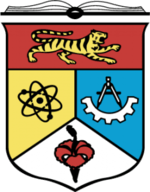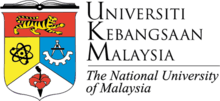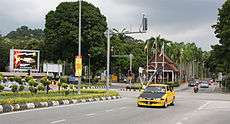National University of Malaysia
The National University of Malaysia (abbreviation: UKM; Malay: Universiti Kebangsaan Malaysia; abbreviated UKM) is a public university located in Bandar Baru Bangi, Selangor which is at south of Kuala Lumpur. Its teaching hospital, Universiti Kebangsaan Malaysia Medical Centre (UKMMC) is located in Cheras and also has a branch campus in Kuala Lumpur. It is the among the most prestigious universities in Malaysia and Southeast Asia. There are 17,500 undergraduate students enrolled, and 5,105 postgraduate students of which 1,368 are foreign students from 35 countries.[5]
 | |
| Motto | Mengilham Harapan, Mencipta Masa Depan[1] |
|---|---|
Motto in English | Inspiring Futures, Nurturing Possibilities[2] |
| Type | Public research university |
| Established | 18 May 1970 |
| Chancellor | Tuanku Muhriz ibni Almarhum Tuanku Munawir |
| Vice-Chancellor | Professor Ir. Dr. Mohd. Hamdi bin Abdul Shukor |
| Pro-Chancellors |
|
| Students | 26,961 (2016)[3] |
| Undergraduates | 12,897 (2016)[3] |
| Postgraduates | 14,064 (2016)[3] |
| Location | , , |
| Affiliations | ACU, ASAIHL, AUN, AUAP[4], UAiTED |
| Website | www |
 | |

National University of Malaysia is one of six research universities in the country. It was ranked number 259th in the world by QS World University Rankings in 2014.[6] It is ranked 98th place in the 100 best new universities established within the last 50 years in the world. It is the only university from Malaysia that made it in the 2012 Quacquarelli Symonds (QS) Top 50 Universities Under 50 Years Old list ranked in the 31st place. It placed 56th and 56th in the QS Top 500 Asian University Rankings in 2014 and 2015 respectively. It is ranked at 160th position in world in the 2020 QS World University Rankings making it a top tier university internationally.[7].
History
Universiti Kebangsaan Malaysia, the national university of Malaysia was born from the aspirations of the nationalists to uphold the Malay language as a language of knowledge. The quest for a national university was suggested in 1923 by the writer Abdul Kadir Adabi as a move against British colonisation. This nationalist tide galvanised Malay intellectuals of the time but met British suppression. The nationalists never wavered and in 1969 the movement again blossomed. A Sponsoring Committee chaired by Syed Nasir Ismail, a Malay intellectual, was set up to prepare a report recommending the establishment of UKM. Other prominent members of this committee include Dr. Mahathir Mohamed (Tun), Malaysia's fourth Prime Minister who was then the Education Minister, and Dr. Mohd Rashdan Haji Baba, who later became UKM's first Vice-Chancellor.
Universiti Kebangsaan Malaysia opened its doors on 18 May 1970 to 192 undergraduate students in Jalan Pantai Baru, Kuala Lumpur, a temporary campus housing three main faculties, the Faculties of Science, Arts and Islamic Studies. In October 1977, UKM moved to its present premises which form the main campus in Bangi. The campus has a size of 1,096 hectares (2,710 acres), situated in the metropolis encompassing the Kuala Lumpur International Airport, Kuala Lumpur, the main commercial centre, and Putrajaya, the administrative capital. The UKM Bangi Campus is 45 km (28 mi) from KLIA, 30 km (19 mi) from Kuala Lumpur and 20 km (12 mi) from Putrajaya.
UKM has two health campuses, the Kuala Lumpur campus in Jalan Raja Muda Abdul Aziz, and the UKM Medical Centre in Cheras. The Kuala Lumpur campus consists of the Faculties of Health Sciences, Pharmacy, Dentistry and the Pre-Clinical Departments of the Medical Faculty. With a size of 20 hectares (49 acres), the Kuala Lumpur campus was established in 1974.
The campus in Cheras consists of the Medical Faculty, the UKM Teaching Hospital and the UKM Medical Molecular Biology Institute (UMBI). The Cheras campus was opened in 1997. Besides these campuses, UKM operates seven research stations (RS); The Tasik Chini RS, The Marine Ecosystem RS, The Langkawi Geopark RS, The Marine RS, The Fraser's Hill RS, The Plant Biotechnology RS and in the main campus itself, the UKM Campus Living Laboratory, which comprises the UKM Permanent Forest Reserve, or its Malay name, Hutan Simpan Kekal UKM as well as the Fernarium and the Herbarium.
Based on a foundation of 30 years of research, UKM was awarded the status of a Malaysian Research University in October 2006 by the Ministry of Higher Education, a move designed to propel the four public universities into leading research universities in line with the Higher Education Strategic Plan 2007–2020.
The year 2006 also saw UKM winning the Prime Minister's Quality Award. This award vindicates UKM's efforts at quality education and management, as outlined by the objectives of the UKM Strategic Plan 2000–2020 (PS2020). The Strategic Plan has been augmented by the newly unveiled UKM Knowledge Ecosystem Transformation Plan, a transformation set to catapult UKM into the league of leading research universities by 2018.
The list of vice-chancellors of Universiti Kebangsaan Malaysia.
| Vice-Chancellor | Academic Qualification | Term in office |
|---|---|---|
| 1 Professor Tan Sri Datuk Dr. Rashdan Baba | Diploma of Agriculture(Malaya Agriculture College), Bachelor of Agriculture Science(Reading, UK), PhD in Agriculture Science(Leeds, UK). | 1970–1971 |
| 2 Datuk Dr. Ariffin Ngah Marzuki | Bachelor of Medical & Surgery-MBBS(Malaya), Master of Surgeon in Obstetricians & Gynaecologists(RCOG, UK). | 1971–1974 |
| 3 Professor Tan Sri Dato’ Dr. Mohd Ghazali Abdul Rahman | Bachelor of Science(Western Australia), PhD in Science(Western Australia). | 1974–1975 |
| 4 Professor Tan Sri Dato’ Dr. Anuwar Mahmud | Bachelor of Veterinary Science(India), Master of Science(Hawaii, US) | 1975–1980 |
| 5 Professor Tan Sri Dato’ Dr. Awang Had Salleh | Bachelor of Arts in Malay Studies(Malaya), Master of Education(Malaya), PhD in Education & Sociology(Stanford, US). | 1980–1984 |
| 6 Professor Tan Sri Dato’ Dr. Abdul Hamid Abdul Rahman | 1984–1993 | |
| 7 Professor Dato’ Dr. Mohd Sham Mohd Sani | Bachelor of Arts in Geography(Canterbury, New Zealand),PhD in Geography(UKM). | 1993–1998 |
| 8 Professor Tan Sri Dato’ Dr. Anuwar Ali | Bachelor of Science in Economics(Queen’s, Ireland), Master of Economics(Leicester, UK), PhD in Economics(Kent, UK). | 1998-2003 |
| 9 Professor Tan Sri Dato’ Dr. Mohd Salleh Mohd Yasin | Bachelor of Biological Science(ITB, Indonesia), PhD in Science(Bath, UK). | 2003-2006 |
| 10 Professor Tan Sri Dato’ Dr. Sharifah Hapsah Syed Hasan Shahabudin | Bachelor of Medical & Surgery-MBBS(Malaya), Master of Health Science in Personnel Education(NSW, Australia), PhD(NSW, Australia). | 2006-2014 |
| 11 Professor Tan Sri Dato’ Dr. Noor Azlan Ghazali | Bachelor of Economics(Malaya), Master of Public Administration(Harvard, US), Master of Business Administration(Nebraska-Lincoln, US), PhD in Economics(Nebraska-Lincoln, US). | 2014-2018 |
| 12 Professor Ir. Dr. Mohd Hamdi Abdul Shukor | Bachelor of Mechanical Engineering(Imperial College, London), Master of Science in Advanced Manufacturing Technology and System Management(Manchester, UK), PhD in Engineering(Kyoto, Japan). | 2019-Incumbent |
Academics
Faculties
- Social Science and Humanities (established in 1970 as Faculty of Arts)
- Science and Technology (established in 1970 as Faculty of Sciences)
- Islamic Studies (established in 1970)
The three above make up the founding faculties.
- Medicine
- Health Sciences
- Dentistry
- Economics and Management
- Education
- Engineering and Built Environment
- Information Science and Technology
- Pharmacy
- Law
- Graduate School of Business
Service Centre
- Chancellory Office
- Department of Registrar
- Department of Bursary
- Department of Development & Maintenance
- Centre for Corporate Communications
- Centre for Quality Assurance
- Centre for Research & Instrumentation Management
- Centre for Collaborative Innovation
- Centre for Teaching & Learning Technologies
- Centre for Information Technology
- Centre for Kesatria
- International Relations Centre (UKM Global)
- Centre of Risk Management, Sustainability & Occupational Health (ROSH)
- Graduate Centre
- Strategy-UKM
- Students and Alumni Affairs
- Sport Centre
- UKM Library
- UKM Press
- UKM Islamic Centre
- UKM Medical Centre
- UKM Children's Specialist Hospital
- PERMATApintar™ National Gifted Center
- Office of the Legal Advisor and Integrity
Institutes
- Fuel Cell Institute (SELFUEL)
- Institute for Environment & Development (LESTARI)
- Institute for Malaysian & International Studies (IKMAS)
- Institute of Ethnic Studies (KITA)
- Institute of Microengineering & Nanoelectronics (IMEN)
- Institute of Climate Change (IPI)
- Institute of Systems Biology (INBIOSIS)
- Institute of the Malay World & Civilization (ATMA)
- Institute of Visual Informatics (IVI)
- Institute of Islam Hadhari (HADHARI)
- UKM Medical Molecular Biology Institute (UMBI)
- Solar Energy Research Institute (SERI)
- Institut of Ear, Hearing & Speech (I-HEARS)
Residential Colleges
- Kolej Aminuddin Baki (KAB)
- Kolej Burhanudin Helmy (KBH)
- Kolej Dato' Onn (KDO)
- Kolej Ibrahim Yaakub (KIY)
- Kolej Ibu Zain (KIZ)
- Kolej Keris Mas (KKM)
- Kolej Pendeta Zaba (KPZ)
- Kolej Rahim Kajai (KRK)
- Kolej Tun Dr. Ismail (KTDI)
- Kolej Tun Hussein Onn (KTHO)
- Kolej Tun Syed Nasir (KTSN)
- Kolej Ungku Omar (KUO)
Notable alumni
- Mohd Rashid Hasnon, Deputy Speaker of the House of Representatives, former Deputy Chief Minister I of Penang
- Sheikh Muszaphar Shukor, Malaysia's first astronaut
- Syed Hussein Alatas, Malaysian academician, sociologist and politician
- Anthony Loke Siew Fook, former Minister of Transport of Malaysia
- Liow Tiong Lai, former Minister of Transport of Malaysia
- Dr. Jemilah Mahmood, Chief of the Humanitarian Response Branch, United Nations Populations Fund (UNFPA) in New York
- Anwar Fazal, Father of Malaysian NGO Movement – Honorary Doctorate in Law, 1997
- Razali Ibrahim, former Deputy Minister in the Prime Minister's Department
- Halimi Abd Manaf, Deputy Secretary General of Ministry of Defence
- Ramlan Bin Ibrahim, diplomat, Permanent Representative of Malaysia to the United Nations
- Ayman Rashdan Wong, writer
- Jess Lee, singer
- Mohamad Fuzi Harun, 11th Inspector-General of Royal Malaysian Police
- Nenney Shushaidah Binti Shamsuddin, one of the two female Syariah High Court Judges in Malaysia
- Abdul Hamid Bador, 12th Inspector-General of Royal Malaysian Police
- Mohd Zuki Ali, 15th Chief Secretary to the Government of Malaysia
- Noor Hisham Abdullah, Director-General of Health
Rankings
| Year | Rank | Valuer |
|---|---|---|
| 2005 | 185 | Times Higher Education World University Rankings – QS World University Rankings |
| 2006 | 185 | |
| 2007 | 309 | |
| 2008 | 250 | |
| 2009 | 291 | |
| 2010 | 263 | QS World University Rankings |
| 2011 | 279 | |
| 2012 | 261 | |
| 2012 | N/A (did not submit data)[8] | Times Higher Education World University Rankings |
| 2014 | =269 | QS World University Rankings |
| 2015 | =259 | |
| 2016 | =312[9] | |
| 2017 | =302[10] | |
| 2018 | =230[10] | |
| 2019 | =184[10] | |
| 2020 | =160[10] |
When the Times Higher Education Guide University Rankings (THE) was published in October 2014, it was reported that UKM, along with Universiti Malaya, opted to not submit data for consideration. UKM Strategic Centre deputy executive director Associate Professor Dr Masturah Markom responded to the snub by saying that the rankings were unfair to the Malaysian education context. She specifically cited the measurement of "industry income" in the THE methodology of university assessment, stating that Malaysian industry input cannot compete with other countries such as the United States of America. This is despite the fact that only a 2.5% weightage is allocated to "industry income" in the methodology, and more conventional categories such as teaching and research still makes up 90% of the methodology.[11][12]
See also
References
- "Moto, Visi, Misi & Falsafah". NUM. Retrieved 1 August 2014.
- "Motto, Vision, Mision & Philosophy". NUM. Archived from the original on 6 June 2014. Retrieved 1 August 2014.
- "Universiti Kebangsaan Malaysia (UKM)". Retrieved 7 March 2017.
- http://auap.sut.ac.th/index.php?option=com_content&task=view&id=52&Itemid=82
- UKM, the National University of Malaysia, About Us Archived 17 October 2007 at the Wayback Machine
- "University of Hertfordshire Rankings". http://www.topuniversities.com/. QS Quacquarelli Symonds Limited. Retrieved 16 September 2014. External link in
|website=(help) - Global Malaysians Network, UKM now ranked way ahead of UM Archived 28 December 2007 at the Wayback Machine, Retrieved on 4 November 2007
- "Archived copy". Archived from the original on 2 October 2014. Retrieved 2 October 2014.CS1 maint: archived copy as title (link)
- "Universiti Kebangsaan Malaysia". Quacquarelli Symonds. Retrieved 16 September 2015.
- "Universiti Kebangsaan Malaysia". Quacquarelli Symonds. Retrieved 16 October 2018.
- "Global education index disappointed UM, UKM snubbed rankings poll". Archived from the original on 2 October 2014.
- "UM and UKM defend snubbing of global varsity rankings". Archived from the original on 2 October 2014.